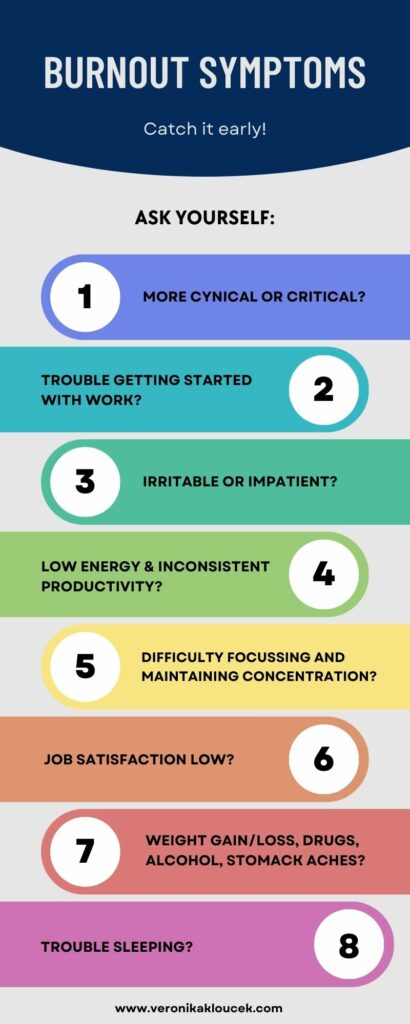
Understanding Burnout: Symptoms and Causes
by Veronika | Jul 10, 2023
Burnout has been a prevalent issue in our fast-paced and demanding world, and post-pandemic it has made an even stronger comeback. A state of chronic physical and emotional exhaustion, burnout can have severe and sometimes life-changing consequences on your mental, emotional, and physical well-being.
Do you worry if you or one of your employees is on a fast trajectory to burnout?
Read on to learn about symptoms and causes of this modern epidemic. What is burnout, what causes burnout, how you recognise whether you suffer from burnout, and how you can prevent it?
What is Burnout?
Burnout is currently not characterised as a condition in the DSM-5. However, the World Health Organization recognises burnout as an important occupational phenomenon under the category of “factors influencing health status or contact with health services” in the ICD-11.
It is a relentless type of work-related stress that’s way beyond simply feeling tired or stressed; it is an overwhelming sense of depletion, a state of physical and/or emotional exhaustion that involves a sense of reduced accomplishment and loss of personal identity.
Burnout can result from chronic workplace or personal stress. Often it occurs alongside or is disguised by depression and/or anxiety. It occurs when an individual feels emotionally drained, experiences a diminished sense of accomplishment, and develops cynicism or detachment from their work or personal life.
Burnout can affect anyone, from savvy professionals in high-pressure jobs to people in the helping professions and students. Individual factors, such as personality traits and family life, make some people more prone to experience burnout.
Causes and Warning Signs of Burnout

Burnout Warning Signals
Several factors contribute to the development of burnout, including excessive workload, lack of control over resources you need to do your work, or inability to influence decisions that affect your job, unclear or shifting expectations, insufficient support, dysfunctional workplace dynamics, highly stressful or very monotonous jobs that require constant focus and energy, work-life imbalance, and high job demands.
Some common warning signs of burnout include:
- Being more cynical or critical
- Finding it difficult to get started with work
- Irritability or impatience
- Low energy, persistent fatigue, decreased motivation and inconsistent productivity, detachment from responsibilities
- Difficulty focussing and maintaining concentration
- Low job satisfaction, negative outlook on life
- Weight gain/loss, turning to substances (drugs, alcohol), physical issues (headaches, stomach aches)
- Trouble sleeping
It’s important to recognise these signs early on to prevent further escalation.
How does Burnout impact Physical and Mental Health?
Burnout takes a toll on both physical and mental health. Physically, it can manifest as:
- Chronic fatigue
- Frequent headaches
- Disrupted sleep patterns
- Weakened immune system
- and increased susceptibility to illnesses.
Mentally, burnout can lead to:
- Anxiety
- Depression
- Feelings of emptiness
- Difficulty concentrating
- and a loss of passion or interest in activities that were once enjoyable.
You can read more about the impact of chronic stress here »
In summary, burnout is a significant concern that affects people across various domains of life. Recognising the signs and taking proactive steps to address and prevent burnout is crucial for maintaining overall well-being and quality of life.
Learn more about How to Prevent Burnout here »
By taking action, you can combat burnout and create a culture that values and prioritises the mental and physical health of individuals. Remember, taking care of yourself is not selfish but essential for long-term happiness and success!
If this article resonates with you and you would like to find out more for yourself or your organisation about how we can help you increase your stress resilience and help prevent burnout, schedule a confidential enquiry call today!
Veronika Kloucek, Senior Psychotherapist, Trainer, Coach

